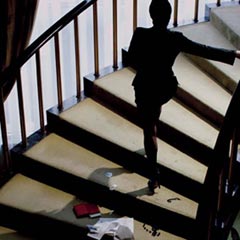 They made their home in the aristocratic city of Porto and Misia was born. Her given name was Susana Maria. She wore a navy-blue uniform and had to stand up straight in silence, a model little girl in the grand house of her father´s family. But then she would hurry down the streets of her chic neighbourhood to take refuge in the warm, perfumed embrace of her grandmother, Lolita, who - untipped cigarette in hand - would describe the adventures of her Bohemian youth…
They made their home in the aristocratic city of Porto and Misia was born. Her given name was Susana Maria. She wore a navy-blue uniform and had to stand up straight in silence, a model little girl in the grand house of her father´s family. But then she would hurry down the streets of her chic neighbourhood to take refuge in the warm, perfumed embrace of her grandmother, Lolita, who - untipped cigarette in hand - would describe the adventures of her Bohemian youth…
So began Misia's rite of passage, the awakening of senses, the call of the theatre´s footlights and wings, the dream of a shining knight to save her from the claws of a monster, a terrifying creature born of her feeling of neglect. Since her parents´ divorce, her mother had been absent, taken up with dancing, her career and delight. So the little girl escaped into a world of forbidden books, draped in old stage costumes, swept off her feet by the sounds and words of fado floating from open windows to wind through the alleys: another song to fill the inner void left by her father, now far away…
 Misia´s courage, thoroughness and extravagance of lifestyle can only be understood in the context of these two women - the first and second ant, as she sees them and herself: three hard-working ants, one after the other, perpetually searching for the Absolute of love and art. Misia and her line of free women, daring to live in defiance of convention, outside the corsets of musical genres and beyond the safe, smooth walls of middle-class order.
Misia´s courage, thoroughness and extravagance of lifestyle can only be understood in the context of these two women - the first and second ant, as she sees them and herself: three hard-working ants, one after the other, perpetually searching for the Absolute of love and art. Misia and her line of free women, daring to live in defiance of convention, outside the corsets of musical genres and beyond the safe, smooth walls of middle-class order.
The implacable aspect of Misia´s mystery - essence of wildflowers, outline of forms, spiritual transcendence, wisdom of poets, travel through books, enchantment and a sense of the real - is rooted in her history of inward and affective exile, which one day became a genuine distancing from her native land. At twenty, Misia set off to join her grandmother in Barcelona. There, she took to every kind of stage, working on her voice as she shaped her life: heedlessly, unreservedly, with courage and humour… At a very early age, she decided she wanted to be a singer and set off directly down that path despite her mother´s warnings and grandmother´s fears, despite the ordeals, hardship and sleepless nights. In Madrid, where a new wind was sweeping away Francoism, Misia made a name for herself.
Misia has at least two countries, several languages and many faces. She is nomadic and sedentary - her home, her shelter, is within her, so she can take wing and land wherever her artist´s destiny leads. Interiors warm as her grandmother´s… a mess of books and silk-covered diaries, and pale-green walls, where the paintings of artist friends catch your eye as you enter her home (today in Lisbon).
 Misia is a committed woman in the Sartrean sense. She is concerned about the world, outraged by injustice and disgusted by hypocrisy and cowardice. Her friends, her tribe, are writers such as Lidia Jorge and José Saramago, poets such as Graça Moura, actresses such as Maria de Medeiros, singers such as Maria Bethania, painters such as Bela Silva and Carlos Torres, and artists such as Sophie Calle. Such encounters enhance Misia's life and fuel her art.
Misia is a committed woman in the Sartrean sense. She is concerned about the world, outraged by injustice and disgusted by hypocrisy and cowardice. Her friends, her tribe, are writers such as Lidia Jorge and José Saramago, poets such as Graça Moura, actresses such as Maria de Medeiros, singers such as Maria Bethania, painters such as Bela Silva and Carlos Torres, and artists such as Sophie Calle. Such encounters enhance Misia's life and fuel her art.
Misia experiments at every moment, with no regrets or plaintive nostalgia for a fantasised past. She goes not yield tamely to obstacles or "common sense“. Misia knows that life is something sublime, something that has nothing to do with the pale, false happiness to which our consumer society seemingly aspires. Misia knows that real life holds death, that passion devastates and love distresses. She knows this is quite simply the way things are, so she remains as close as possible to emotion when she sings. She sculpts her song, her soul, with dedication and care… Only the voice of a woman who carries the scars of fate on her body can make love and passion tangible to such an extent. A woman in love, sovereign and pure, indomitable and still desired, free… A woman who dreams when awake.
Although in the inflexible, petty reality of the day, men and women´s worlds meet in mutual abuse with no hope of understanding, in the night sung by Misia, the miraculous fusion of man and woman becomes possible, bearable… The lyrics speak of impassioned encounters, powerful nostalgia, a past that will not go away, betrayal, rapture, a "state“ of love, rifts…
 Political ethics are apparent in all her songs: ethics of liberty, tolerance and joy, ethics of life against death. "What I want is to talk about life, its miseries and grandeur…“ Misia defies the routine of opaque, closed days, urging us to journey through emotion, to dare to love, cry and laugh as she does each day.
Political ethics are apparent in all her songs: ethics of liberty, tolerance and joy, ethics of life against death. "What I want is to talk about life, its miseries and grandeur…“ Misia defies the routine of opaque, closed days, urging us to journey through emotion, to dare to love, cry and laugh as she does each day.
Against all the odds, Misia has returned from exile. She needs to return to true, popular fado, a fado that has withdrawn into dark, accursed, outdated taverns. She has settled in Lisbon, in a Portuguese society that has not always welcomed her with open arms. Her way of being dispels the static image of the fado singer. Misia persists in solitude and daring. Only poets and musicians accompany her down this path where fado - rethought, reworked and performed in her unique voice - is reborn and spreads. She has not been appeased by success, but still ventures down unknown paths, refusing to abandon her lines of escape. Today, with her Drama Box, she has shattered the walls that surround musical genres, taking tango and bolero in hand and forcing us to listen to them differently. True to herself, to her inner movement, Misia has again begun to journey back and forth, at her own risk, between here and elsewhere, between the lack of a home port and a ceaseless desire for others and the world…
Carmen Castillo.
February 2005
Director of the film "Misia´s Fado“
Official website of Misia
 Misia eludes the words of a biography just as she eludes the prison of a musical genre. She stretches far beyond her place of birth, the frontiers of a country… Misia was born in Porto, took Barcelona by storm and now lives in Lisbon, although she still has her haunts and hairdressers in Paris, Tokyo and Mexico. She has crossed mountains and laid siege to territories, but has above all created a space-time: her world, a weave of sounds buried in the very depths of her body, real-life words, subdued lighting…
Misia eludes the words of a biography just as she eludes the prison of a musical genre. She stretches far beyond her place of birth, the frontiers of a country… Misia was born in Porto, took Barcelona by storm and now lives in Lisbon, although she still has her haunts and hairdressers in Paris, Tokyo and Mexico. She has crossed mountains and laid siege to territories, but has above all created a space-time: her world, a weave of sounds buried in the very depths of her body, real-life words, subdued lighting…
 They made their home in the aristocratic city of Porto and Misia was born. Her given name was Susana Maria. She wore a navy-blue uniform and had to stand up straight in silence, a model little girl in the grand house of her father´s family. But then she would hurry down the streets of her chic neighbourhood to take refuge in the warm, perfumed embrace of her grandmother, Lolita, who - untipped cigarette in hand - would describe the adventures of her Bohemian youth…
They made their home in the aristocratic city of Porto and Misia was born. Her given name was Susana Maria. She wore a navy-blue uniform and had to stand up straight in silence, a model little girl in the grand house of her father´s family. But then she would hurry down the streets of her chic neighbourhood to take refuge in the warm, perfumed embrace of her grandmother, Lolita, who - untipped cigarette in hand - would describe the adventures of her Bohemian youth… Misia´s courage, thoroughness and extravagance of lifestyle can only be understood in the context of these two women - the first and second ant, as she sees them and herself: three hard-working ants, one after the other, perpetually searching for the Absolute of love and art. Misia and her line of free women, daring to live in defiance of convention, outside the corsets of musical genres and beyond the safe, smooth walls of middle-class order.
Misia´s courage, thoroughness and extravagance of lifestyle can only be understood in the context of these two women - the first and second ant, as she sees them and herself: three hard-working ants, one after the other, perpetually searching for the Absolute of love and art. Misia and her line of free women, daring to live in defiance of convention, outside the corsets of musical genres and beyond the safe, smooth walls of middle-class order. Misia is a committed woman in the Sartrean sense. She is concerned about the world, outraged by injustice and disgusted by hypocrisy and cowardice. Her friends, her tribe, are writers such as Lidia Jorge and José Saramago, poets such as Graça Moura, actresses such as Maria de Medeiros, singers such as Maria Bethania, painters such as Bela Silva and Carlos Torres, and artists such as Sophie Calle. Such encounters enhance Misia's life and fuel her art.
Misia is a committed woman in the Sartrean sense. She is concerned about the world, outraged by injustice and disgusted by hypocrisy and cowardice. Her friends, her tribe, are writers such as Lidia Jorge and José Saramago, poets such as Graça Moura, actresses such as Maria de Medeiros, singers such as Maria Bethania, painters such as Bela Silva and Carlos Torres, and artists such as Sophie Calle. Such encounters enhance Misia's life and fuel her art. Political ethics are apparent in all her songs: ethics of liberty, tolerance and joy, ethics of life against death. "What I want is to talk about life, its miseries and grandeur…“ Misia defies the routine of opaque, closed days, urging us to journey through emotion, to dare to love, cry and laugh as she does each day.
Political ethics are apparent in all her songs: ethics of liberty, tolerance and joy, ethics of life against death. "What I want is to talk about life, its miseries and grandeur…“ Misia defies the routine of opaque, closed days, urging us to journey through emotion, to dare to love, cry and laugh as she does each day.